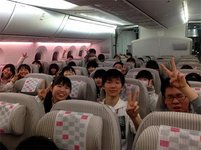The Fukushima Youth Sinfonietta's musical journey started after an earthquake and tsunami triggered a nuclear disaster in Japan in 2011. Pianist Panos Karan went to Japan just months after with his keyboard to perform at evacuation centers. In Fukushima City, he met children who also wanted to use music to bring strength and happiness to people. The idea of the sinfonietta grew from there, and six months later, the musicians had their first concert. This week, Fukushima is in Boston to perform at Symphony Hall.
Η φωτογραφία είναι από τη σελίδα τους στο Facebook:

Και η είδηση από σελίδα του New England Cable News:

Η φωτογραφία είναι από τη σελίδα τους στο Facebook:
Και η είδηση από σελίδα του New England Cable News:
Fukushima Youth Sinfonietta
By Pam Bechtold and Kristy Lee
The Fukushima disaster happened a world away, but this week, Fukushima is in Boston to perform at Symphony Hall. (Published Thursday, March 31, 2016)
The Fukushima disaster happened a world away, but this week, Fukushima is in Boston to perform at Symphony Hall.
The Fukushima Youth Sinfonietta's musical journey started after an earthquake and tsunami triggered a nuclear disaster in Japan in 2011. Pianist Panos Karan went to Japan just months after with his keyboard to perform at evacuation centers. In Fukushima City, he met children who also wanted to use music to bring strength and happiness to people. The idea of the sinfonietta grew from there, and six months later, the musicians had their first concert.
"It transcended language, transcended cultural barriers. It was something exceptionally beautiful," said Karan.
Now in its fifth year, thanks to the guidance of Karan's nonprofit Keys of Change, the sinfonietta has grown to 150 musicians, ranging in age from 13 to 18 years old. Fifty of them have brought their message to Boston.
"Compared to what people will think about the situation in Fukushima, the children and people of Fukushima are a lot of 'ghenki,' powerful," said 13-year-old Mao Ohashi, a trombone player.
While in town, the musicians also get to play tourist. The highlight: Fenway Park, which has been home to popular Japanese players like Koji Uehara and Daisuke Matsuzaka.
The group's nine-day stay in Boston culminates with the Symphony Hall concert.
"We are hoping to keep playing music together in the years and decades to come, even at the time that the young people that are playing in the orchestra don't even know the earthquake of 2011 but still want to have the same core belief that music can change people's lives," Karan said.
The Japan Society of Boston played a key role in bringing the Fukushima Youth Sinfonietta to Boston. The orchestra will take the stage with local guest musicians this Sunday, April 3 at 8 p.m. Tickets for the Symphony Hall concert range from $10-40. If you'd like to be there for their American debut, you can find more information here.
http://www.necn.com/entertainment/the-scene/Fukushima-Youth-Sinfonietta-374223091.html
By Pam Bechtold and Kristy Lee
The Fukushima disaster happened a world away, but this week, Fukushima is in Boston to perform at Symphony Hall. (Published Thursday, March 31, 2016)
The Fukushima disaster happened a world away, but this week, Fukushima is in Boston to perform at Symphony Hall.
The Fukushima Youth Sinfonietta's musical journey started after an earthquake and tsunami triggered a nuclear disaster in Japan in 2011. Pianist Panos Karan went to Japan just months after with his keyboard to perform at evacuation centers. In Fukushima City, he met children who also wanted to use music to bring strength and happiness to people. The idea of the sinfonietta grew from there, and six months later, the musicians had their first concert.
"It transcended language, transcended cultural barriers. It was something exceptionally beautiful," said Karan.
Now in its fifth year, thanks to the guidance of Karan's nonprofit Keys of Change, the sinfonietta has grown to 150 musicians, ranging in age from 13 to 18 years old. Fifty of them have brought their message to Boston.
"Compared to what people will think about the situation in Fukushima, the children and people of Fukushima are a lot of 'ghenki,' powerful," said 13-year-old Mao Ohashi, a trombone player.
While in town, the musicians also get to play tourist. The highlight: Fenway Park, which has been home to popular Japanese players like Koji Uehara and Daisuke Matsuzaka.
The group's nine-day stay in Boston culminates with the Symphony Hall concert.
"We are hoping to keep playing music together in the years and decades to come, even at the time that the young people that are playing in the orchestra don't even know the earthquake of 2011 but still want to have the same core belief that music can change people's lives," Karan said.
The Japan Society of Boston played a key role in bringing the Fukushima Youth Sinfonietta to Boston. The orchestra will take the stage with local guest musicians this Sunday, April 3 at 8 p.m. Tickets for the Symphony Hall concert range from $10-40. If you'd like to be there for their American debut, you can find more information here.
http://www.necn.com/entertainment/the-scene/Fukushima-Youth-Sinfonietta-374223091.html

